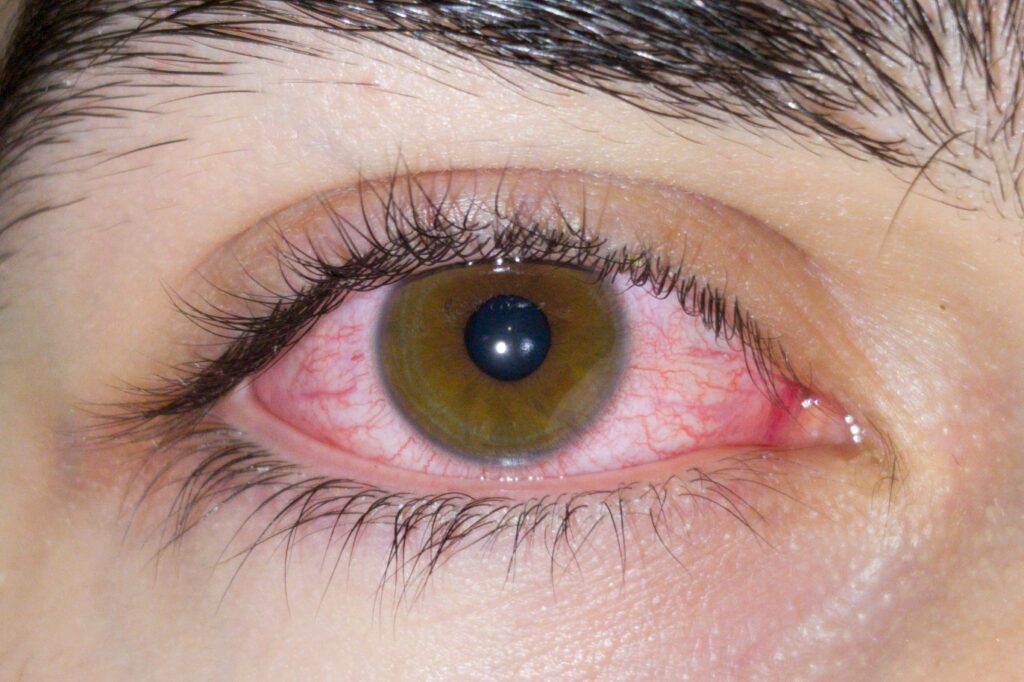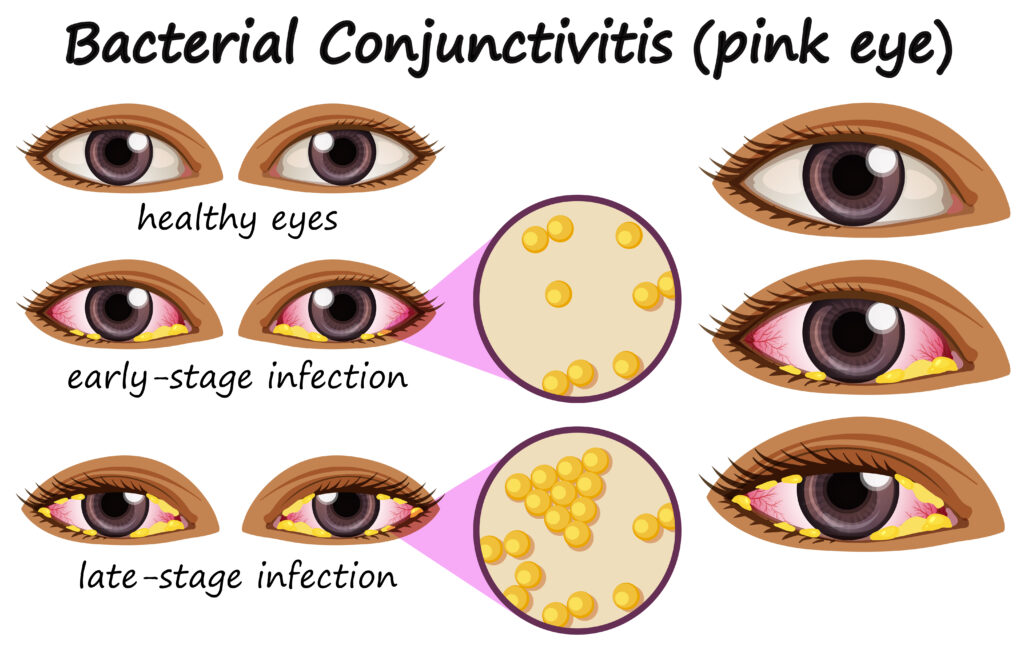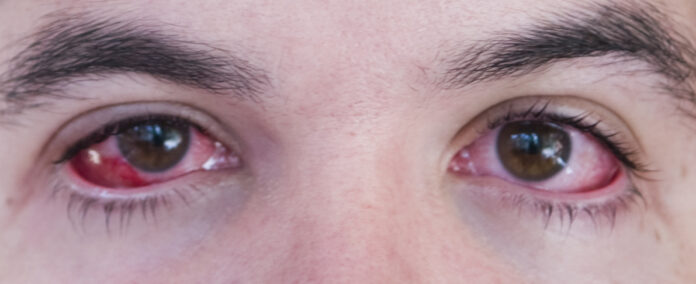Conjunctivitis, also known as Pink eye, is a common eye infection that causes inflammation of the tissues lining the eyelid (conjunctiva). This eye infection has been spreading rapidly in all seven provinces of Nepal. According to the Ministry of Health of Nepal, over 10,000 cases of eye flu have been registered in just the past month.
What is Pink Eye?
Pink eye, sometimes referred to as conjunctivitis, is an inflammation of the conjunctiva. The thin, transparent tissue that covers the white of the eye and borders the inside of the eyelid is called the conjunctiva.

This eye flu frequently occurs in kids. Although it can be contagious and spread quickly through daycare facilities and schools, it is rarely serious. If you catch it early and take care of it, there is very little chance that it could harm your vision. Pinkeye clears up without causing any lasting issues as long as you take the necessary precautions to stop its spread and follow your doctor’s recommendations.
How does it get transmitted?
Conjunctivitis eye infection is highly contagious. These viruses and bacteria can spread from person to person in various ways.
Usually, infected people spread them to others by:
- Direct contact, such as shaking hands or touching
- Respiratory droplets through coughing and sneezing
- Rubbing your eyes after touching contaminated items including towels, pillowcases, cosmetics, or contaminated surfaces without first washing your hands
Signs and symptoms of Pink Eye Infection
The signs and symptoms of pink eye, also known as conjunctivitis, might vary depending on the underlying reason. The following are typical pink eye symptoms and signs:
- Pink or red color in the white of the eye(s)
- Swelling of the conjunctiva (the thin layer that lines the white part of the eye and the inside of the eyelid) and/or eyelids
- Increased tear production
- Feeling like a foreign body is in the eye(s) or an urge to rub the eye(s)
- Itching, irritation, and/or burning
- Discharge (pus or mucus)
- Crusting of eyelids or lashes, especially in the morning
- Contact lenses that feel uncomfortable and/or do not stay in place on the eye

How to prevent pink eye infection?
The best way to prevent pink eye (conjunctivitis) is to maintain excellent cleanliness, stay away from infectious diseases, and take precautions to reduce the chance of transmission. To help prevent pink eye, follow these tips:
- Wash Your Hands Often with Soap and Warm Water: It’s important to wash your hands frequently with soap and warm water to stop the transmission of bacteria that can lead to diseases like conjunctivitis. The risk of spreading bacteria or viruses from surfaces to your eyes is lower when you have clean hands.
- Do not share personal items: Personal products like towels, cosmetics, eyeglasses, contact lenses, and makeup brushes shouldn’t be shared. The likelihood of spreading diseases like conjunctivitis from one person to another increases when personal belongings are shared.
- Be mindful of Touching Things: Because germs can survive on surfaces for a while, use caution when handling things in public. To reduce the chance of contaminating your eyes with germs, refrain from touching your face, especially your eyes.
- Stay away from crowded places: Crowded areas raise the risk of coming into contact with contagious people. Consider spending less time in crowded locations when conjunctivitis or other illnesses are in the region to lessen the chance of transmission.
- Avoid Touching or Rubbing Your Eyes: Introducing bacteria from your hands into your eyes by touching or rubbing them increases the risk of infections. Even though your eyes are itchy, it’s crucial to repress the temptation to touch them.
- Do not use swimming pool: If you have conjunctivitis it is best to avoid using swimming pools until the infection has totally resolved. Swimming could potentially transfer the condition to other people since chlorine in pools may not completely destroy all germs.
How long does conjunctivitis last?
In most cases, the eye infection will go away on its own in 7 to 14 days without any long-term effects or treatment. Viral conjunctivitis, however, can occasionally take two to three weeks or longer to go away. To treat more severe conjunctivitis conditions, a doctor may prescribe an antiviral medicine.
Home remedies for pink eye
While home remedies for pink eye (conjunctivitis) offer some comfort, it’s important to remember that they should not be used in place of professional medical guidance. To manage the symptoms of pink eye infection, people sometimes find the following home remedies helpful:
- Warm compress: Applying a warm, damp compress to the affected eye might help ease irritation and lessen crusting. Use a warm, soft cloth. Ensure that the towel is not too hot before applying it lightly to the closed eyelid.
- Cold compress: A cold compress can be soothing for an irritated or scratchy eye. Apply an ice pack or clean towel wrapped in a thin cloth for brief intervals to the closed eyelid.
- Hygiene: Use good hygiene to avoid passing on the pink eye to others or from one eye to the other. Avoid touching your eyes, wash your hands frequently, and use separate towels and pillowcases.
- Avoid Irritants: If you have allergic conjunctivitis, find out which allergens cause your symptoms and stay away from them. During pollen seasons, keep windows closed, use air purifiers, and wash your bedding frequently.
These home remedies offer short-term relief for moderate pink eye symptoms. It’s crucial to get medical attention if your symptoms are severe, there is discharge coming from your eyes, or if the illness worsens or persists.
Conclusion
Pink eye, often known as conjunctivitis, affects people of all ages and can be contagious. People can protect their eye health and stop the spread of conjunctivitis by using proper hygiene and being aware of eye infections. Together, let’s raise awareness of eye health issues and put an end to the spread of this eye disease.
More from OYE KTM: 7 Things You Must Know To Fight Dengue In Nepal



